Call of Duty WW2 Gets Reviews That Remind Us of the Black Ops Days
Call of Duty finds its soul again in the Second World War.
This article first appeared on USgamer, a partner publication of VG247. Some content, such as this article, has been migrated to VG247 for posterity after USgamer's closure - but it has not been edited or further vetted by the VG247 team.
USgamer was not able to attend the Call of Duty: WWII review event and is only just getting a copy of the game for review. You'll have to wait a bit before we can fully tackle the game. Until then, here's an idea of how this year's Call of Duty shakes out.
Last year's Call of Duty, Infinite Warfare, was a fine game, but it was clear that Activision's top shelf franchise had lost a bit of the hype and heat. This year, the publisher and developer Sledghammer Games are heading back to the series' most popular conflict before Modern Warfare: World War II. That's right, Call of Duty: WWII pulls the series back to the past after rocketing into the future.
Did the shift pay off, or has Activision and Call of Duty lost the first-person shooter crown to EA and Battlefront?
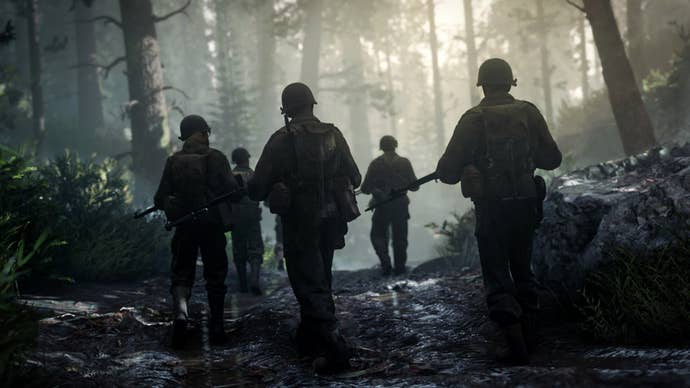
With a number of reviews in, Call of Duty: WWII (OpenCritic: 86, Metacritic: 86) sits right below last year's well-received Battlefield 1 (OpenCritic: 87, Metacritic: 88). It seems going back to World War II is exactly what the game needed. A part of that seems to be the more direct nature of classic-era weapons, versus the more technology-based and drone-style weapons of Advanced Warfare, Black Ops III, and Infinite Warfare.
"It’s wiping the slate clean on guns and gear that really reinvigorates things this year," wrote GamesRadar's Leon Hurley (Score: 4 out of 5). "As good as the more recent futuristic stuff has been, it has all blurred into one big mush of space weapons and drones - one part shooting to two parts that bit in Minority Report when Tom Cruise starts putting his fingers all over the screen. Stripped of all that, WW2 has nothing but a trigger pull and, if you’re lucky, a hit."
"It’s wiping the slate clean on guns and gear that really reinvigorates things this year."
-GamesRadar's Leon Hurley
A big part of the new experience is an all-new story campaign that one reviewer noted took around six hours to complete. A number of writers pointed to extensive entertainment media based on World War II as inspiration, citing works like Saving Private Ryan and Band of Brothers. We have an existing concept of what World War II was like and Call of Duty doesn't stray far from that idea. Reviewers were mixed on the effectiveness of the story campaign. Gamespot's Miguel Concepcion (Score: 9 out of 10) enjoyed it and thought the themes of brotherhood were strong.
"Call of Duty's long-awaited return to its World War II roots is not only a homecoming, but also a commemoration of the powerful bonds that form between brothers in arms," he says in his review. "Call of Duty: WWII's moving campaign also salutes the brotherhood that grows and strengthens on the battlefield. Seen through the eyes of an American soldier and a few other Allies, this affecting story offers brief glimpses of how the Nazi occupation ravaged Europe and its people, including German civilians."
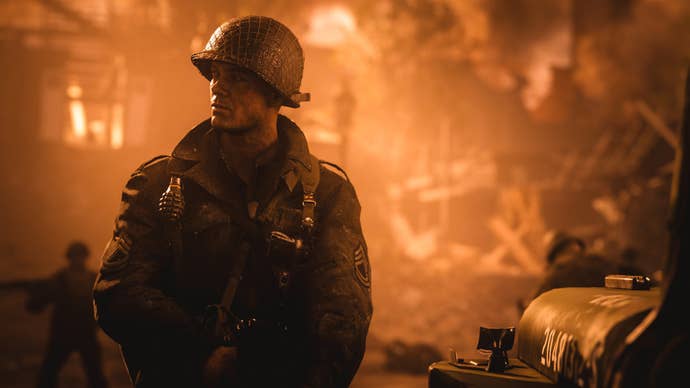
In Call of Duty: WWII players take on the role of Private Ronald "Red" Daniels of the 16th Infantry Regiment. He is the game's primary point-of-view, like many other Call of Duty titles. The game also steals an idea from Battlefield 1 as the campaign also shows you the war through the eyes of others within the conflict.
"While this is clearly Daniels' story, developer Sledgehammer thoughtfully shifts your perspective from time to time by putting you in other soldiers' boots, from Perez, a tank commander, to Rousseau, a French resistance operative," says Concepcion. "These valuable interludes relieve you of playing as the typical one-man army from start to finish. Sure, in the right hands, Daniels can be the war's greatest sniper and an accomplished AA gun operator in the same playthrough, but this campaign is a group effort and ultimately benefits from it."
Others weren't enthused with the campaign though, calling it a complete retread of the ideas presented in previous World War II-related entertainment. Polygon's review by Russ Frushtick (No Score Yet) isn't complete, but he found that the game's themes clashed heavily with the gameplay underpinning the experience.
"In a lot of ways it attempts to reboot the series as a more grounded, more sober military shooter that’s less Michael Bay and more Ken Burns. That desire to tell a realistic, compassionate story is constantly at odds with the desire to make an engaging first-person shooter in which the player cuts through hordes of generic foot-soldiers," explains Frushtick.
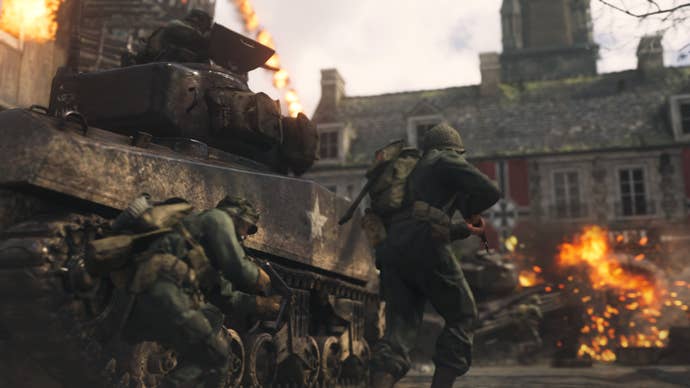
"That desire to tell a realistic, compassionate story is constantly at odds with the desire to make an engaging first-person shooter in which the player cuts through hordes of generic foot-soldiers."
-Polygon's Russ Frushtick
"Just about every mission feels like déjà vu, as if I’d played it before in another game, be it Medal of Honor: Allied Assault or, hell, even the first two Call of Duty games. I’ve landed on these beaches, I’ve cleared these trenches, I’ve driven tanks through these streets. One stand-out mission, set in Nazi-occupied Paris, does rustle up some novelty, but the remaining 10 all feel like flashbacks to missions I played a decade ago," he says. "If you’ve seen Band of Brothers, Saving Private Ryan or frankly any other World War II flick made during the last 30 years, you’ll be trekking over familiar ground in the Call of Duty: WWII campaign."
Sledgehammer did more than just hire some actors and write up a new story campaign for the same old gameplay though. Mechanics have changed, like replacing regenerating health with health packs for the first time since Call of Duty: Modern Warfare ditched them in 2007. A number of writers noted this adds a bit more tension to the game and creates and experience that's more deliberate.
"This change works better than expected. Don’t count on ducking behind cover whenever you’ve taken a bunch of shots to the torso. You need to be more cautious and forward-thinking, collecting health items and putting yourself in safe spaces to survive. Feeling semi-powerless when you’re low on health with no healing items stored adds a nice level of tension to otherwise typical scenarios," says Polygon's Frushtick.
"Combat itself is not about rushing forward to the next objective," writes Concepcion of GameSpot. "It's about hunkering down at nearly every fallen table, picking off just enough Nazis to give you an opening to the next cover point. Whether you're toughing out every yard of forward progress with your best available machine gun, or quietly knifing Nazis in the tough-but-fair stealth sections, the campaign delivers a wealth of harrowing battles where checkpoints feel well-earned.
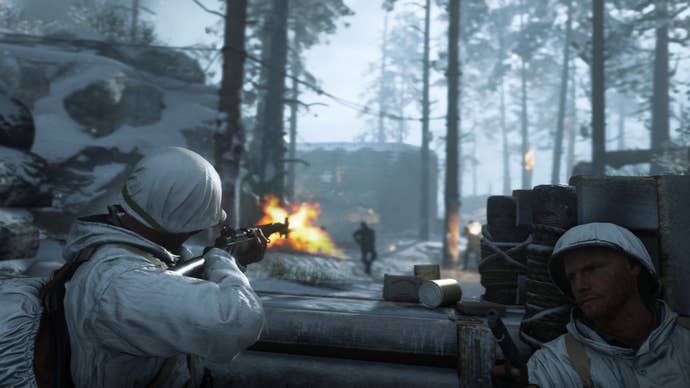
The campaign also plays up the theme of brotherhood by forcing players to call on their squadmates for help. One provides ammo for your weapons, another can spot enemies in low-visibility areas. Your medic can patch you up if you're lacking a health pack. You'll have to wait between requests for the same ally, which reviewers noted adds a solid rhythm to play.
"The narrative focus on the members of the squad seamlessly bleeds over into the gameplay with a new system that forces the player to rely on the men around them," says EGM reviewer Nick Plessas (Score: 8.5 out of 10). "Past Call of Duty games had the player as such an unstoppable powerhouse that fellow soldiers felt more like scenery than active participants in the fight. WWII’s Squad Support mechanic not only necessitates more strategic positioning and resource management in the heat of battle, it also gives the player’s squad a reason to be there beyond barking out orders."
"If you’re looking for something that has established front lines and rewards for working as a team, War is worth a look."
-Game Informer's Daniel Tack
The robust multiplayer modes of the franchise return in Call of Duty: WWII, albeit in new forms adjusted to the era. Players battle it out across 10 maps, with straightforward modes like Deathmatch, Team Deathmatch, Domination, and Hardpoint returning to service. War is a new 6v6 objective-oriented mode for the game, similar to Battlefield 1's Rush mode. Teams attempt to conquer one asymmetrical section of the map at a time, creating a stronger team-based experience. War also lacks a personal kill scoreboard, keeping players focused on the objective, not their killstreaks.
"The new objective-oriented War mode includes all kinds of various activities such as moving a tank, building a bridge, and capturing point after point, so traditional gunning for a big kill-death-assist ratio is a thing of the past. If you’re looking for something that has established front lines and rewards for working as a team (and where you won’t get gunned down in the back less than a second after you spawn) War is worth a look," says Game Informer's Daniel Tack (Score: 8.75 out of 10).
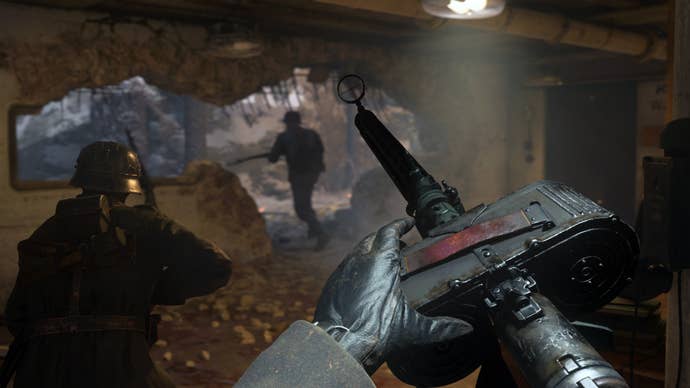
Uplink returns as Gridiron, a mode where you carry a football into the enemy team's goal. Call of Duty: WWII lacks the jetpacks, double jump, and wall-running of previous games, but apparently Gridiron retains the excitement and strategy that makes the mode work.
"Divisions are a confident step in a new direction for Call of Duty."
-EGM's Nick Plessas
Call of Duty: WWII offers a new class system for multiplayer called Divisions. Players can choose from one of five Divisions: Infantry, Airborne, Armored, Mountain, Expeditionary. These divisions allow players to unlock abilities for specific playstyles, while giving them more freedom in their weapon choices. Airborne players can move faster, Mountain players move quieter, and Armored members can shrug off explosions that would kill others.
"Divisions are a confident step in a new direction for Call of Duty, incorporating some of the strategy and team coordination of class-based shooters without appreciably limiting players in how they build their ideal soldier. At the very least, it is a far more concise system than the sometimes convoluted Pick 10/Pick 13 systems from previous games," explains EGM's Plessas.
Zombies returns as well, with reviewers noting that this year's experience is a bit more gruesome and horror-tinged than previous outing. Many note that the zombies are more aggressive overall and there are more types to tackle. Game Informer's Dan Tack says that Zombies "plays more like a structured story than previous versions," giving players more to do compared to other outings.
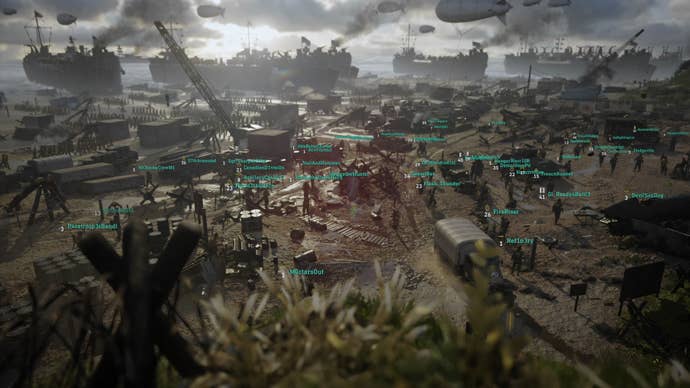
There's a new multiplayer hub in the form of Headquarters as well, which GamesRadar's Hurley calls "Destiny’s Tower in all but name". It's a D-Day beachfront where players can mingle, customize their characters, test weapons out, and talk to vendors. There's also a 1v1 arena called the Pit, where you can challenge other players.
There was surprisingly little talk about Call of Duty: WWII's version of loot boxes, Supply Drops. Supply Drops offer cosmetic items like soldier clothes, gun skins, emotes, and callsigns. They also give timed XP multipliers. You can open Supply Drops in Headquarters and watching others open their Supply Drops gives you a social score, which has its own reward system.
It seems that Call of Duty: WWII pulls the franchise out of the funk it's been in. Modern Warfare was a good idea for its time, and futuristic combat was intriguing, but it looks like players were ready to go back to the war that started Call of Duty in the first place.
"Call of Duty: WWII is built on a foundation of familiarity from which it benefits greatly," says EGM's reviewer. "The most significant changes to the status quo don’t reinvent the game, but instead take popular ideas from other corners of the genre and effectively implement them without losing what defines a Call of Duty game. Games often try to set their sights exclusively on the horizon in front of them, but Call of Duty: WWII shows us that there is value in taking a look back from whence you came."

